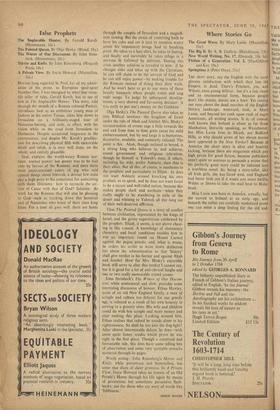False Prophets
A Private View. By Joyce Howard. (Macmillan, 16s.)
HAVING long regarded St. Paul, for all my admir- ation of his prose, as European spoil-sport Number One. 1 was intrigued by what that versa- tile teller of tales, Gerald Kersh, has to say of him in The Implacable Hunter. This story, told through the mouth of a Roman colonial Prefect, introduces Saul as an ambitious young man of fashion in his native Tarsus, takes him down to Jerusalem on a brilliantly-staged tour of Nazarene-baiting. and ends, in effect, with his vision while on the road from Jerusalem to Damascus. Despite occasional longueurs in the conversation, and despite Mr. Kersh's predilec- tion for describing physical filth with inexorable detail and relish, it is very well done, on the whole, and entirely plausible.
Saul, explains the world-weary Roman nar- rator, wanted power; but power was to be had only by favour of the Romans, and since these were uncircumcised eaters of pig who said cynical things about Jehovah, a devout Jew must pay a high price to his conscience for associating with them. Dilemma: how to reconcile the ser- vice of Cmsar with that of God? Solution: do work for the Romans that will also be pleasing to God—such as tracking down this heretical sect of Nazarenes who boast of their risen king Jesus. For a time all goes well; there are hunts
through the cesspits of Jerusalem and a magnifi- cent stoning. But the strain of contriving both to have his cake and eat it (not to mention worry about his impotence) brings Saul to breaking point. He takes to a hair-shirt, he takes to fasting. and finally and inevitably he takes refuge in a nervous fit followed by delirium. During this crisis another solution is revealed to him: if he changes sides and takes up with the Christians, he can still claim to be the servant of God and he can still enjoy power—by making trouble for the Romans instead of doing their dirty work. And he won't have to go to any more of those beastly banquets where people vomit and sing rude songs. To judge by subsequent develop- ments. a very shrewd and far-seeing decision : it was early to put one's money on the Galilman.
Olga Hesky's The Painted Queen also takes us into Biblical territory—the kingdom of Israel under the rule of Ahab and Jezebel. Mrs. Hesky's reconstruction of events sags a little towards the end and from time to time gives cause for mild embarrassment, but by and large it is humorous, decorative, readable, and eminently rational. The point is this: Ahab, though inclined to brood, is a strong king who believes in, and achieves, sound government and religious toleration; though he himself is Yahweh's man, if others, including his wife, prefer Ashtarte, then that is their affair. But all this, of course, is anathema to the prophets and particularly to Elijah: he does not want Ashtarte around knocking his own product, so to speak, and he does not want Israel to be a secure and well-ruled nation. because this makes people slack and unchaste—when they really ought to be wandering in exile or the desert and whining to Yahweh all day long out of their well-deserved affliction.
Thus The Painted Queen is a story of conflict between civilisation, represented by the kings of Israel, and the grimy superstitions celebrated by the prophets. Elijah, it seems, is not above cheat- ing in this contest. A knowledge of elementary chemistry and local conditions enables him to win an important round on Mount Carmel against the pagan priests; and, what is worse, he orders his scribe to write down deliberate lies about the administration so that 'history' shall give verdict in his favour and against Ahab and Jezebel. How far Mrs. Hesky's enjoyable book will serve to alter this verdict I cannot say, but it is good for a lot of anti-clerical laughs and one or two really memorable crowd scenes.
John Steinbeck's The Winter of Our Discon- tent, while sentimental and slow, provides some interesting discussion of honour. Ethan Hawley. scion of an old New England family, a man of scruple and culture too delicate for our greedy age, is reduced as a result of his own honesty to serving in a grocery store. His wife and children could do with less scruple and more money and start making this plain. Looking around him, Ethan realises that indeed he stands alone in his righteousness. So shall he too join the dog-fight? After almost interminable delays, he does—with some quite funny results which prove he was right in the first place. Though a contrived and foreseeable tale, this does have some telling bits of observation and some very quotable remarks scattered through its pages.
Worth noting: John Rosenberg's Mirror and Knife, while portentous and humourless, has some nice slices of sheer grimness. In A Private View, Joyce Howard takes an inmate of an Old People's Home through his life again by means of pretentious but sometimes persuasive flash- backs; not for those who are wary of words like 'fulfilment.'
SIMON RAVEN


































 Previous page
Previous page